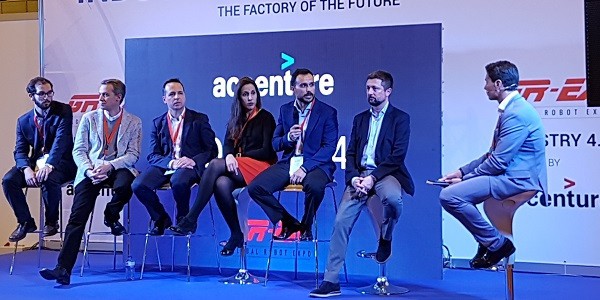Industrial Robotics, IoT and cybersecurity, an integrated and global transformation

In the context of the digital transformation and the use of enabling technologies to drive Industry 4.0, the Internet of Things (IoT) becomes the connected thread to optimize the use of each technology in the various fields of application. IoT technology is now enabling us to generate new models of interaction between people and the physical objects surrounding them. Robotics also comes into its own here, giving birth in 2014 to the concept of IoRT (Internet of Robotics Things).
This was the central theme of the speech given by Ángel Cristóbal Lázaro, Business Partner of GMV’s Secure e-Solutions sector, in Global Robot Expo’s Industry 4.0 debating panel organized by the Spanish Association of Electronics, Digital Contents and ICT Companies (Asociación de Empresas de Electrónica, Tecnologías de la Información, Telecomunicaciones y Contenidos Digitales: AMETIC) under the title “Robotics, a key to competitiveness and industrial flexibility”. This dealt with the potential and importance of the integration of robotics with other technologies to boost the efficiency and productivity of the industrial sector.
The success of Industry 4.0 depends on tackling the digital-transformation challenges in a global and integrated way, without seeing each innovation differently, and seeking digital platforms that blend current IT systems with those to come. IoT in particular is based on the secure communication and transfer of information between each of the actors forming part of any process, with the aim of harnessing the data generated and turning it into information, thus bringing the physical and digital worlds closer together.
In the IoRT paradigm the robot is not simply an isolated being capable of acting in accordance with the data it itself takes and processes; through IoT technology it can also graft onto its own processes new information already processed by other actors in the whole process (other robots, sensors, actuators, etc). Likewise, these robots can tap into the state indicators of other robots to find out which situations or variables lead to a given situation of the process, optimizing and improving tasks and, at the same time, helping the systems themselves to become more efficient and flexible.
We might take as our example here the maintenance tasks that industrial robots are employed on. One particular robot can predict that it is going to suffer a fault on the grounds that it is presenting similar anomalies to a robot that suffered this same fault two weeks ago.
Cybersecurity as a design principle
Internet connectivity is a key factor of Industry 4.0 development, from which it follows that cybersecurity is also a crucial feature in its correct development. This is a wide-ranging concept with many ramifications, including the control of physical access to hardware as well as the protection of software and data by means of network access or code injection. It should not be construed solely as a competitiveness factor but as a necessary lever to be taken into account as a design principle for introducing industry 4.0 technology.
In the words of Ángel Cristóbal Lázaro “In the scenario that we have sketched out previously, the application of better cybersecurity techniques will allow us to build up an environment in which robots are working in close cooperation without any risk of causing damage to people, other robots or production itself” .
Security should be conceived as a design principle and brought into the IT world, which is the industry that has suffered most attacks in its short history, driving a breakneck development to mitigate any problems that might crop up.
All these elements mentioned by GMV’s expert in the debating panel are technologies the company has been working with for some time now. In GMV we have been developing and integrating turnkey and robotics systems since 1993 for various application sectors and within a wide range of services taking in integration and system engineering, design, implementation and integration of robotized solutions (sensors, actuators, robotic-arm control and real-time systems), guidance, navigation and control, artificial intelligence, data-processing and control systems, testing and verification, etc. Nonetheless, as a benchmark cybersecurity firm, GMV offers secure value-chain-adapted solutions and services that are now proving their efficiency in such specific environments as the ones we are dealing with here.